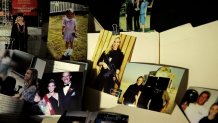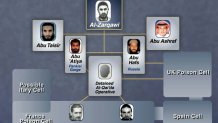She tracked the world’s most notorious terrorists in the years after 9/11, yet she calls herself the "unexpected spy."
Warm and welcoming, Tracy Walder is the opposite of what you might expect from a former CIA operative.
“People don’t necessarily see us coming,” Walder said. “And sometimes it can seem a bit disarming, and perhaps that’s a good thing.”
Her journey from Southern California girl to sorority sister to the CIA and FBI is told in her new book, "The Unexpected Spy," with co-author Jessica Anya Blau. Walder said it took three attempts to get the book approved by the CIA, and readers will notice there are some passages of the book that remain redacted.
She writes about her deep interest in politics and history throughout her childhood and how applying for the CIA happened on a whim during a college career fair at her alma mater The University of Southern California. She had forgotten she submitted her resume to a recruiter until she got a phone call months later and decided to go through the process.
“I think for me it was, ‘Why not?’" Walder recalled. “To me, I viewed it as an experience I may never have again. I thought if there was a time in my life where I’m going to work long hours, travel, do sort of risky things, this is the time to do that.”
Walder went from never having held a gun to being assigned counter-terrorism and receiving an appointment to a deeply-classified operation just days before Sept. 11, 2001.

“I remember asking very naively, ‘Will we have to kill anyone?’” Walder said. “And they said, ‘Oh no. Not unless there’s an attack.’”
Local
The latest news from around North Texas.
She writes about the intense pressure within the agency after the attacks and her role in the failed mission to get Osama bin Laden as he hid in the mountains of Tora Bora, Afghanistan.
In her book, she spoke candidly about dropping in and out of combat zones and watching her work be politicized.
Walder wrote she was angry watching on television as then-Secretary of State Colin Powell addressed the United Nations in 2003, using a chart she made, to rally support for the Iraq invasion. Yet, Walder said the chart had been renamed and none of the terrorists listed were connected to Iraqi President Saddam Hussein.

“It sort of made me realize, ‘What are we doing?’” Walder said. “What is the point of the information we’re gathering? Is the point to protect Americans? Or is the point to serve a political agenda?”
Yet, Walder said she supported the Iraq war and remained resolved to save lives.
“Instead of sitting around and complaining, do something about it,” Walder said. “I still had a job to do.”
Walder ultimately left the CIA and joined the FBI, hoping to continue fighting terrorism without the rigorous travel demands.
She graduated from the FBI academy in Quantico, Virginia before being assigned to counter-terrorism operations in Los Angeles. Yet, she wrote how she was shocked at the discrimination she faced within the bureau and left after a year.
“I just kept looking back on the success I had at the [CIA] and I realized the problem is not with me,” Walder said. “The problem is you and your views on what the gender narrative should be.”
That experience fueled a life-long desire to teach, something Walder did the past 10 years at Dallas’ Hockaday School.
She wants young women to know society’s expectations do not define them and femininity is a strength.
“We’re more empathetic,” Walder said. “We’re better listeners and that can translate into cultivating better assets for our country.”
Walder's wish is for her story to inspire young women to have their own ‘unexpected life.’
“Femininity and law enforcement and espionage and these careers fit just fine,” Walder said. “We need more women in these careers desperately.”
Walder currently serves on the board of directors for Girl Security, a non-partisan nonprofit focused on encouraging girls in high school to pursue careers in national security.



